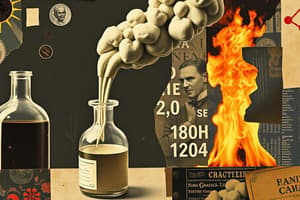Podcast
Questions and Answers
HCl + NaOH – H2O + NaCl – this double replacement reaction can also be known as an ______ reaction
HCl + NaOH – H2O + NaCl – this double replacement reaction can also be known as an ______ reaction
acid-based neutralization
When mixing two aqueous solutions then getting gas as its product, this is known as ______ reaction
When mixing two aqueous solutions then getting gas as its product, this is known as ______ reaction
gas evolution
NaCl + KNO3 – NaNO3 + KCl – When mixing two aqueous elements, the chances of getting a ______ are possible
NaCl + KNO3 – NaNO3 + KCl – When mixing two aqueous elements, the chances of getting a ______ are possible
both aqueous
The chemicals or elements functional groups can be found in the ______ in the periodic table of elements
The chemicals or elements functional groups can be found in the ______ in the periodic table of elements
These are the acetic acid, formic acid, glycolic acid, phenol, ethanol, methanol, ethylene glycol, and ______
These are the acetic acid, formic acid, glycolic acid, phenol, ethanol, methanol, ethylene glycol, and ______
A ______ reaction is something typically that is burning and releases a lot of energy.
A ______ reaction is something typically that is burning and releases a lot of energy.
The general form of a Synthesis or Combination Reaction is ______ = AB.
The general form of a Synthesis or Combination Reaction is ______ = AB.
A ______ reaction breaks down larger compounds or elements into smaller components.
A ______ reaction breaks down larger compounds or elements into smaller components.
The form of a Single Replacement Reaction is A + ______ = AC + B.
The form of a Single Replacement Reaction is A + ______ = AC + B.
In Double Replacement reactions, the general form is AB + CD = ______ + BC.
In Double Replacement reactions, the general form is AB + CD = ______ + BC.
An example of a combustion reaction is ______ + O2 = CO2 + H2O.
An example of a combustion reaction is ______ + O2 = CO2 + H2O.
During a decomposition reaction, heating a metal carbonate can cause ______ elements to be released.
During a decomposition reaction, heating a metal carbonate can cause ______ elements to be released.
In a Single Replacement reaction, metals can sometimes replace ______ elements.
In a Single Replacement reaction, metals can sometimes replace ______ elements.
Flashcards are hidden until you start studying
Study Notes
Types of Chemical Reactions
-
Combustion Reaction
- Involves burning substances, releasing significant energy.
- Products commonly include carbon dioxide (CO2) and water (H2O).
- Examples include:
- C8H8 + O2 → CO2 + H2O
- C2H5OH + O2 → CO2 + H2O
-
Synthesis or Combination Reaction
- Involves combining two elements or compounds to form a larger compound.
- General formula: A + B → AB.
- Examples include:
- Mg + O2 → MgO
- MgO + CO2 → MgCO3
-
Decomposition Reaction
- Breaks down larger compounds into smaller components; the reverse of synthesis.
- General formula: AB → A + B.
- Heat can cause metal carbonates to decompose into carbon dioxide and a metal oxide.
- Examples include:
- MgCO3 → MgO + CO2
- HgO → Hg + O2
- H2O → H2 + O2
-
Single Replacement Reaction (Single-Displacement Reaction)
- Involves one element displacing another in a compound.
- General formula: A + BC → AC + B, where A and B are pure elements.
- Examples include:
- Zn + CuCl2 → ZnCl2 + Cu (Zinc displaces Copper)
- Br2 + NaI → NaBr + I2 (Bromine displaces Iodine)
- Fe + HCl → FeCl2 + H2 (Iron displaces Hydrogen)
- Non-metals can also displace metals.
-
Double Replacement Reaction
- Involves the exchange of ions between two compounds.
- General formula: AB + CD → AD + BC.
- Examples include:
- AgNO3 + NaCl → AgCl + NaNO3 (Silver pairs with Chloride)
- Types of double replacement reactions:
- Precipitation Reaction: Results in a solid product, e.g., HCl + NaOH → H2O + NaCl.
- Acid-Base Neutralization Reaction: Mixing an acid and a base yields water and a salt.
- Gas Evolution Reaction: Formation of gas, e.g., Na2S + HCl → NaCl + H2S.
- If products remain aqueous, no reaction occurs.
-
Context on Aqueous Solutions
- Aqueous phase composition is influenced by feedstock and reaction conditions.
- Functional groups of elements can be referenced using the periodic table.
- Common compounds include acetic acid, formic acid, glycolic acid, phenol, ethanol, methanol, ethylene glycol, and lactone.
Studying That Suits You
Use AI to generate personalized quizzes and flashcards to suit your learning preferences.




